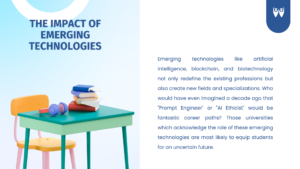
As the world keeps evolving at a frenetic pace, so too is the job market evolving at the same speed. Automation, artificial intelligence, and technological advancement are revolutionizing industries and giving birth to whole new industries—many of which did not exist ten years ago. So the question is: how do universities equip students for jobs that don’t yet exist? Around the globe, future-proof universities are rising to the challenge, reinventing education for the unknown future.
The Need for Future-Proof Education
Understanding the Changing Job Market
A report from the World Economic Forum in 2020 estimated that 65% of the children beginning primary school today will be working in entirely new kinds of jobs that have yet to be invented. They may be working in areas such as space tourism, virtual reality therapy, climate engineering, or quantum computing. Universities are going to need to move away from standardized, fixed curriculums and toward a more fluid, adaptive type of learning if they are to stay relevant.
The Impact of Emerging Technologies

Emerging technologies like artificial intelligence, blockchain, and biotechnology not only redefine the existing professions but also create new fields and specializations. Who would have even imagined a decade ago that “Prompt Engineer” or “AI Ethicist” would be fantastic career paths? Those universities which acknowledge the role of these emerging technologies are most likely to equip students for an uncertain future.
Strategies Universities Are Undertaking
Prioritizing Lifelong Learning and Soft Skills
Most important perhaps is concentrating on transferable skills such as communication, critical thinking, creativity, and flexibility. These “soft” skills are most valuable to career success and especially helpful when confronting new or unclear jobs.
In addition, the higher learning institutions are encouraging the lifelong learning culture. Rather than preparing students for a career, institutions are encouraging the continuous learning aspect, skill renewal, and career flexibility.
Interdisciplinary Learning
Most of the jobs of the future will require a skill set that crosses disciplines. Interdisciplinary learning is being promoted in the universities by integrating computer science and arts, engineering and biology, and business and environmental science. One can graduate with a degree in Environmental Engineering with electives in policy studies and data science and become a “Climate Data Strategist” or “Sustainability Technologist.”
Collaborations with Industry
To stay on the bleeding edge, universities are partnering with startups, technology incubators, and businesses. By doing this, they provide their students with exposure to the actual business world to industry trends and map curriculums for meeting future and current needs. Students are bridged via internships, live projects, and guest lectures by industry specialists to connect the dots of students and a changing work world.
Understanding Technology to Teach
Experiential Learning and Simulation
Colleges now are looking at technology-enabled learning platforms, such as virtual labs, simulation rooms, and gamification platforms, to offer students experiential learning in state-of-the-art workspaces. Medical students, for example, use VR to practice surgeries virtually, and engineering students can use AR to model and design complex systems.
Online Learning and Microcredentials
The new digital platforms have also enabled universities to offer microcredentials and modularity. Students can build their own personalized learning pathways, accumulating certifications and skill packages that can be reconfigured as market directions shift. This is reinforced by the ease of entry into new careers without having to substitute an entire degree.
Building an Innovation Ecosystem
Entrepreneurship and Incubation Centers
Rather than simply preparing students for employment in the job market, some universities are creating entrepreneurial thinkers by building startup accelerators and incubators on campus. Such centers enable student innovation, where young entrepreneurs can imagine solutions to tomorrow’s problems and even create jobs of tomorrow for themselves in some instances.
Fostering Research and Inquiry

Research is now not the domain of researchers and graduate students alone. Undergraduate students are also being exhorted now to take up research work in newer fields such as artificial intelligence, sustainability, robotics, and man-machine interface. Exposure to research makes the student understand the problems of the future more deeply and how they might be engaged to solve them.
Conclusion
While the future is not certain, universities are doing their best to prepare students for the unknown. Through interdisciplinary learning, technology embracing, soft skills development, and innovation, universities are equipping students with the attitude and ability to thrive in an evolving work environment. As disciplines converge and new disciplines evolve, this one thing is certain: the universities that define today will shape tomorrow’s leaders.
